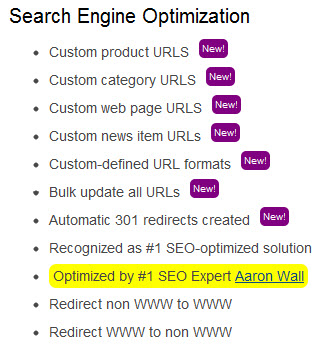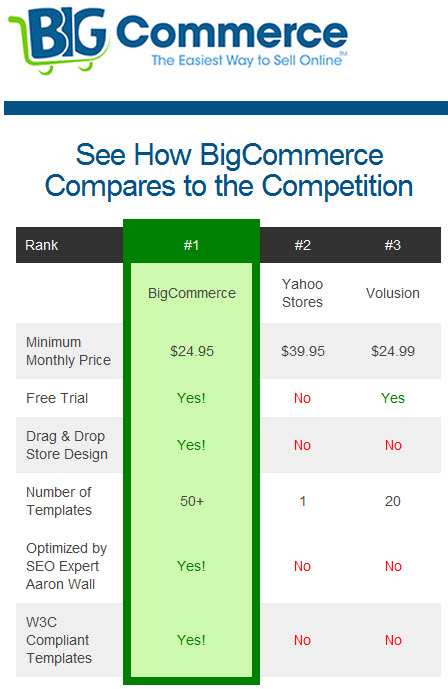Over 5 years ago I had a quick chat with the folks from Interspire about their websites, including their shopping cart at the time & offered a few tips to fix some of the obvious issues I saw. This was over a half-decade ago & under a different product name & entirely informal.
Anyhow...as they later ramped up on marketing, they at some point claimed that I somehow "certified" their software, even as the version changed, their product name changed, their mode of sales changed (from primarily pushing a downloadable software product to an SAAS model), many SEO fundamentals changed over the years, and so on.
Becoming Sales Copy
In spite of all the above changes, I have not viewed/used/reviewed the product in any way in years. Yet I am still listed as having optimized it.

Not only am I a feature on the sales letter, but I am a highlighted one AND the link is nofollowed :D
After I mentioned the above to them & asked them to take my name down, I recommended them to another friend who is an SEO, but they did not work with him. I think they sort of brushed off the issue by suggesting that they endorse us & send a lot of customers our way, however one can easily see that our logo isn't on pages like this one bigcommerce.com/products-we-like.php & even if it were, that wouldn't make it correct to say I somehow certified their software.
Test Everything
Does that faux certification impact their sales? I guess so, since the "feature" is highlighted, they are great marketers who do conversion testing, and I get chat messages out of the blue like: "hello aaron. just wanted to ask if you really helped out with developing bigcommerce shopping cart?"
Just today I got "Aaron, Love your work and insights! BigCommerce touts your expertise in creating their SEO features, so I bring this question to you. Using domaintools.com all the IP addresses for any BigCommerce cart show Sydney as the location associated with the IP. Doesn't this create a search results handicap for Big Commerce users who are located outside AUS and market primarily in North America? Matt Cutts says IP location makes a difference - youtube.com/watch?v=keIzr3eWK8I What is the best solution for using BigCommerce for shops based in North America? Are carts like Volusion, which show Simi Valley CA USA IP locations better than Big Commerce's Sydney AUS IP location for North America? Kind regards, -Marc "
Asking a Second Time
I forgot about the issue for a while & then about a half-year ago I asked a second time if they would please take my name off their sales material, based on a customer complaint:
Hi Eddie
this is the second time I have asked you to remove my name from your sales material for promoting the SEO viability of your product. It mis-represents a 5 minute off the record chat into something more than that, and what is worse the product has changed greatly since then. At this point the faux recommendation is harming my reputation.
"Hey Aaron,
I was just recommending the SEOBook community to the owner of -------.com and he mentioned to me that Interspire was still using your name as someone who endorses their product. He was surprised, with the horrible SEO issues inherent in the cart. I told him you probably didn't even realize they were still using your name. Anyway, just thought you might like to know. The cart is ok with loads of customizations (maybe most others are no better), but it sucks out of the box...lots of issues with URLs, duplication, etc., etc.
Hope all is well,
David"
please do not require me to ask a third time to fix this issue
cheers
aaron
They said it would be sorted in a couple days.
Days Turn Into Months
Months later a friend sent me one of their marketing emails...there I was yet again.

Are they 100% certain that I have not worked for either of those companies? Did they bother to ask me before their promotional email went out? Of course not. I am just a blurb of sales text, inserted as needed to increase sales.
I asked in private for them to stop this multiple times. I am not the type of guy to "sick lawyers on them" or whatever, so I am hoping that this blog post will help the issue go away.
Respect is important. If you use someone's name in your marketing then you should stop using it if they ask you to.
Disclaimers
I know their company is growing like a weed & growth can be hard to manage. For all I know their software is relatively good in terms of pricing and feature set when compared against other ecommerce software, however that is only speculation as I haven't done any sort of formal SEO audit.
I wouldn't hesitate to recommend their stuff as an option for an ecommerce platform, but when their marketing says that I have done any sort of formal in-depth SEO work on it, that is both inaccurate and done without my consent or permission.


